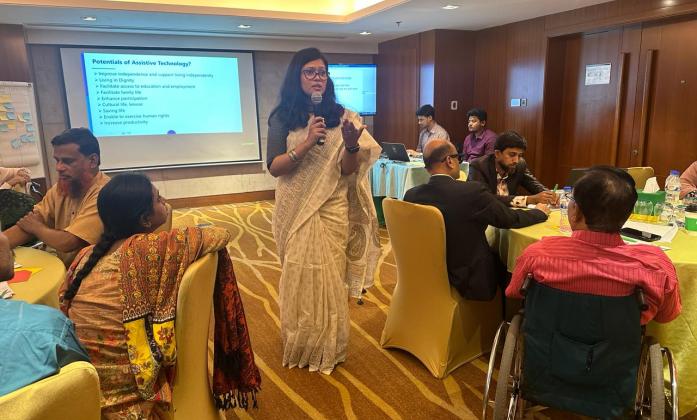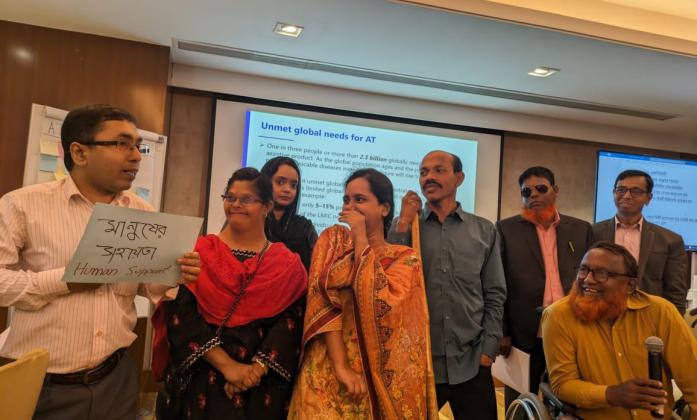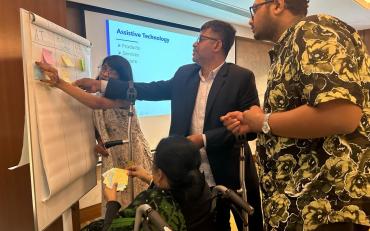21-23 February 2024: International Disability Alliance (IDA), in collaboration with ATscale, Global Disability Innovation Hub, Sightsavers International and UK Aid’s Inclusive Futures programme hosted an in-depth workshop on assistive technology in Dhaka, Bangladesh. The workshop aimed to strengthen capacities of Organizations of Persons with Disabilities (OPDs) in assistive technology and to highlight the importance of persons with disabilities participating in design, delivery systems, programs and policies related to assistive technology. This is one of 3 national level workshops being implemented under the project “Boosting AT User Engagement and Knowledge, Globally and Locally” co-delivered by ATscale and IDA.
 The workshop was attended by 20 participants from urban and rural areas of Bangladesh representing different groups of disabilities, including persons with down syndrome, cerebral palsy, and deafblindness. The facilitation team comprised of IDA staff members, an IDA-GDI Hub AT user fellow, along with alumni of the Bridge CRPD-SDGs training initiative, the workshop covered sessions on fundamentals of assistive technology, financing AT and the role of social protection, and AT delivery systems. During these sessions, participants determined the relevance of AT in the implementation of Convention on Rights of Persons with Disabilities (CRPD) mandates and achieving Sustainable Development Goals (SDGs). They engaged in group activities to discuss the situation of access to AT in Bangladesh, examined case studies and proposed recommendations as OPD leader(s) to improve the availability, accessibility, affordability, adaptability, acceptability and quality of assistive technology.
The workshop was attended by 20 participants from urban and rural areas of Bangladesh representing different groups of disabilities, including persons with down syndrome, cerebral palsy, and deafblindness. The facilitation team comprised of IDA staff members, an IDA-GDI Hub AT user fellow, along with alumni of the Bridge CRPD-SDGs training initiative, the workshop covered sessions on fundamentals of assistive technology, financing AT and the role of social protection, and AT delivery systems. During these sessions, participants determined the relevance of AT in the implementation of Convention on Rights of Persons with Disabilities (CRPD) mandates and achieving Sustainable Development Goals (SDGs). They engaged in group activities to discuss the situation of access to AT in Bangladesh, examined case studies and proposed recommendations as OPD leader(s) to improve the availability, accessibility, affordability, adaptability, acceptability and quality of assistive technology.
Participants exchanged views with representatives from Helen Keller International, which is partnering with ATscale and the Center for Disability in Development as part of the workshop. The exchange provided stakeholders with valuable insights into challenges and priorities regarding access to assistive technology from the user's perspective. The HKI team highlighted the importance of networking with OPD leaders nationwide, recognizing them as vital partners in their ongoing study to enhance inclusivity, credibility, and recommendations.
“…the workshop taught us how to assess the access to assistive technology by using AAAA & Q framework. Now we know the barriers of accessing AT, who the funding agencies are and who to work with for enhancing access to AT in Bangladesh. I will share these knowledge and information with my fellow self-advocates so that we can amplify our voice to ensure access of persons with intellectual disabilities to assistive technologies at an affordable cost.”
- Sultana Mushfiqua Phool, Self-advocate, Down Syndrome Society of Bangladesh.

At the end of the workshop, participants proposed a two-three-year advocacy plan, focusing on policy improvement, information dissemination, inter-ministerial cooperation, and financing. The activities proposed will include advocacy campaigns targeting policymakers and the wider community, research initiatives to assess AT impact and recommend policy changes, centralizing AT information for better dissemination, advocacy with relevant ministries for cooperative action and budget allocation, and ensuring meaningful participation of persons with disabilities in budget planning processes.

